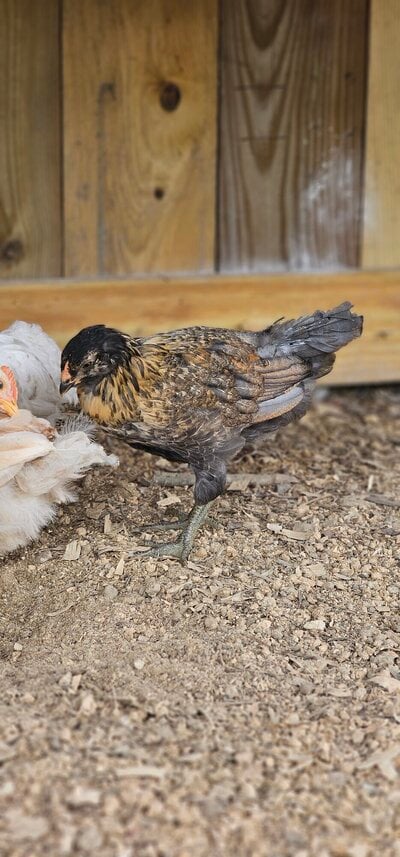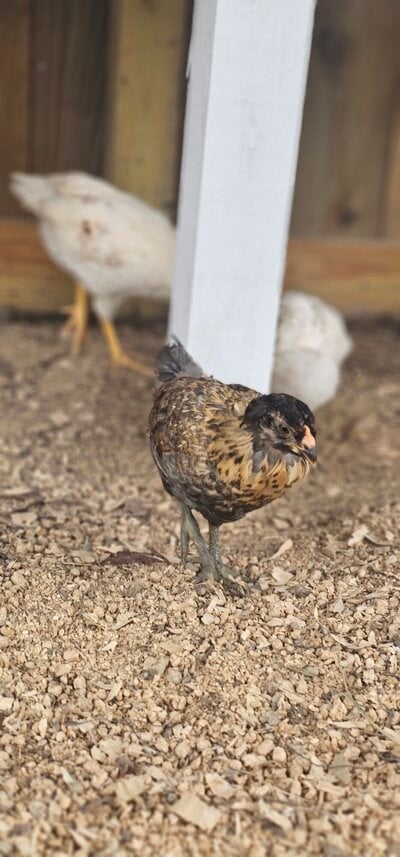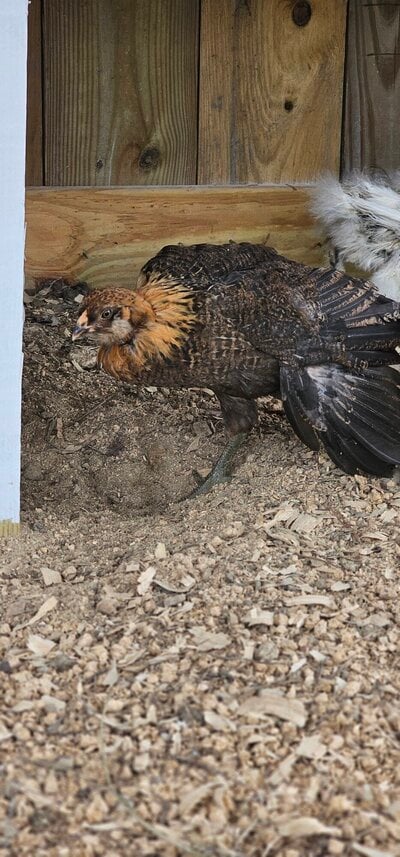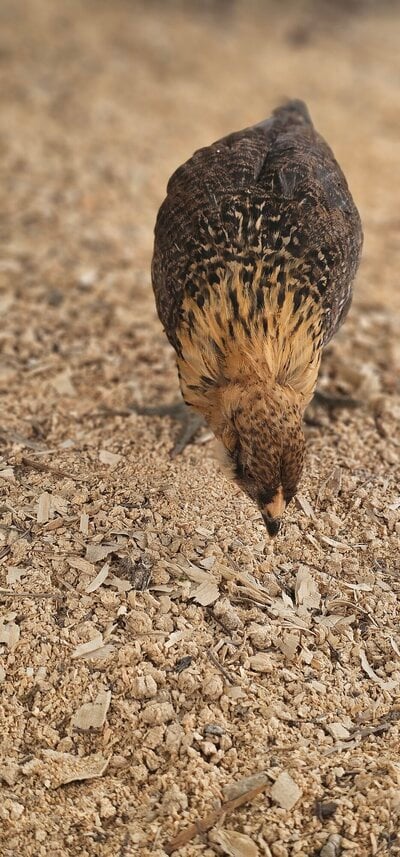- Thread starter
- #11
Navigation
Install the app
How to install the app on iOS
Follow along with the video below to see how to install our site as a web app on your home screen.
Note: This feature may not be available in some browsers.
More options
You are using an out of date browser. It may not display this or other websites correctly.
You should upgrade or use an alternative browser.
You should upgrade or use an alternative browser.
Americanas from tractor supply🤔
- Thread starter Clt1988
- Start date
SwampPrincessChick
Crowing
They are both definitely female Easter Eggers.
I am unsure if anyone else has said this, so sorry if you have, but I will explain something. An Easter Egger is a chicken that is a mixed breed with Ameraucana genetics somewhere in their lineage, and they must carry the blue, green or pink egg gene. With Easter Eggers being so popular, not many people want Ameraucanas and they are becoming more rare and unseen as time passes. Hatcheries and feed stores have a trick to get more buyers: places like Tractor Supply, for example, may label their Easter Eggers as Americanas (notice the difference in wording from Ameraucana). This makes people think they are carrying the rare breed Ameraucana, which is spelled differently, and they are more likely to purchase them. This means that Easter Eggers and Americanas are the same thing, one is just the normal name (Easter Egger) and one is just a trick made up by hatcheries and feed stores (Americana). This trick should be illegal because it is false advertising, but they do it anyway.
I am unsure if anyone else has said this, so sorry if you have, but I will explain something. An Easter Egger is a chicken that is a mixed breed with Ameraucana genetics somewhere in their lineage, and they must carry the blue, green or pink egg gene. With Easter Eggers being so popular, not many people want Ameraucanas and they are becoming more rare and unseen as time passes. Hatcheries and feed stores have a trick to get more buyers: places like Tractor Supply, for example, may label their Easter Eggers as Americanas (notice the difference in wording from Ameraucana). This makes people think they are carrying the rare breed Ameraucana, which is spelled differently, and they are more likely to purchase them. This means that Easter Eggers and Americanas are the same thing, one is just the normal name (Easter Egger) and one is just a trick made up by hatcheries and feed stores (Americana). This trick should be illegal because it is false advertising, but they do it anyway.
Not quite how I would put it.I am unsure if anyone else has said this, so sorry if you have, but I will explain something. An Easter Egger is a chicken that is a mixed breed with Ameraucana genetics somewhere in their lineage, and they must carry the blue, green or pink egg gene.
I would say that "Easter Eggers" are any chickens that lay blue or green eggs but do not belong to a recognized pure breed.
It doesn't matter whether they are descended from Araucanas, or Ameraucanas, or Cream Legbars, or directly from the original blue-layers that did not become any of those breeds. They are still "Easter Eggers" if they lay blue or green eggs.
As regards a "pink" egg gene, I disagree about there being any special pink egg gene that makes a bird count as an Easter Egger. Blue and green eggs have a specific gene (blue egg gene), that is not found in chickens who lay white or brown or "pink" eggs. So if we are just splitting them up by egg color, blue and green are Easter Eggers, white and brown and cream and pink and dark brown are not.
Hatcheries do usually say that their Easter Eggers will include a few that lay white or brown or pink eggs, but those are more like a mistake, not the special colors that most people are trying to get when they buy Easter Eggers.
The birds sold as "Americanas" are usually wanna-be-Ameraucana types, but they are definitely not the only kind of Easter Eggers.
- Thread starter
- #14
That is good info. Thank you so much.They are both definitely female Easter Eggers.
I am unsure if anyone else has said this, so sorry if you have, but I will explain something. An Easter Egger is a chicken that is a mixed breed with Ameraucana genetics somewhere in their lineage, and they must carry the blue, green or pink egg gene. With Easter Eggers being so popular, not many people want Ameraucanas and they are becoming more rare and unseen as time passes. Hatcheries and feed stores have a trick to get more buyers: places like Tractor Supply, for example, may label their Easter Eggers as Americanas (notice the difference in wording from Ameraucana). This makes people think they are carrying the rare breed Ameraucana, which is spelled differently, and they are more likely to purchase them. This means that Easter Eggers and Americanas are the same thing, one is just the normal name (Easter Egger) and one is just a trick made up by hatcheries and feed stores (Americana). This trick should be illegal because it is false advertising, but they do it anyway.
SwampPrincessChick
Crowing
I have seen this so many times and, sorry, I still do not believe it. The pink egg gene makes sense, but originally the only Easter Eggers being sold (back when Easter Eggers first started being a thing) came from Ameraucana lineage, so I believe it is wrong to change what they were first. That would make as much sense as suddenly announcing that Golden Comets could be a hybrid between a Barred Plymouth Rock and an Old English Game, instead of their actual parentage. I do not believe in changing things far from their original concept.Not quite how I would put it.
I would say that "Easter Eggers" are any chickens that lay blue or green eggs but do not belong to a recognized pure breed.
It doesn't matter whether they are descended from Araucanas, or Ameraucanas, or Cream Legbars, or directly from the original blue-layers that did not become any of those breeds. They are still "Easter Eggers" if they lay blue or green eggs.
As regards a "pink" egg gene, I disagree about there being any special pink egg gene that makes a bird count as an Easter Egger. Blue and green eggs have a specific gene (blue egg gene), that is not found in chickens who lay white or brown or "pink" eggs. So if we are just splitting them up by egg color, blue and green are Easter Eggers, white and brown and cream and pink and dark brown are not.
Hatcheries do usually say that their Easter Eggers will include a few that lay white or brown or pink eggs, but those are more like a mistake, not the special colors that most people are trying to get when they buy Easter Eggers.
The birds sold as "Americanas" are usually wanna-be-Ameraucana types, but they are definitely not the only kind of Easter Eggers.
When do you think Easter Eggers first started being a thing?I have seen this so many times and, sorry, I still do not believe it....originally the only Easter Eggers being sold (back when Easter Eggers first started being a thing) came from Ameraucana lineage, so I believe it is wrong to change what they were first. That would make as much sense as suddenly announcing that Golden Comets could be a hybrid between a Barred Plymouth Rock and an Old English Game, instead of their actual parentage. I do not believe in changing things far from their original concept.
As far as I can tell, for quite a while, the chickens being sold that came from Ameraucana lineage were being CALLED "Ameraucanas," not Easter Eggers.
Example from McMurray Hatchery:
"We have been breeding Ameraucanas since the 1980s-- even before they were admitted into the Standard of Perfection by the American Poultry Association in 1984."
https://www.mcmurrayhatchery.com/ameraucanas.html
(And I've seen them listed in the McMurray catalog as "Ameraucanas" since at least the early 1990s)
At the present time, there are lots of hatcheries selling chicks that they call "Easter Eggers," and I agree that a fair number of them do look like they have some Araucana or Ameraucana heritage. But certainly not all of them. Example:
https://www.hoovershatchery.com/easteregger.html
Hoovers Hatchery sells "Easter Eggers," and they show a photo of just one adult hen. She lacks pea comb, lacks muff/beard, lacks Ameraucana body shape-- except for the fact that she is a chicken, she doesn't look anything at all like an Ameraucana!
As for the Golden Comet analogy: "Red Sexlink" is a good generic term for the common hybrids that lay brown eggs and are color-sexable (red males, white females.) Hatcheries almost never call them "Red Sexlinks," because they use fancier names like Golden Comet and ISA Brown and Red Star, but the thing they all have in common is being color-sexable with females being red.
But "Golden Comet" is one specific version of Red Sexlink. So it is not the same thing as the term "Easter Egger" that is being widely used with quite a few different meanings (all centering around blue or green eggs.)
Besides, if you trace their ancestry back about a century, you will find that Araucanas and Ameraucanas and Cream Legbars all got their blue egg gene from the same source: blue-laying chickens from South America. So as regards the blue egg gene, they are all the "same" anyway. And once there are a few generations of crossing, there is no way to tell whether the blue egg gene came through an actual Ameraucana, or through some other pure breed, or through a line of descent that never reached purebred status for any breed at any point.
Last edited:
New posts New threads Active threads
-
Latest posts
-
Incubating duck eggs with different stages of incubation
- Latest: quackkquack_
-
-
-
-
-
Latest threads
-
Any and all advice for a brand new chicken owner: I know NOTHING!
- Started by StefneyRSA
- Replies: 0
-
-
-
-
-
-
Threads with more replies in the last 15 days
-
-
-
Ended Official BYC Caption Contest 05-10-24 Pic by LavenderDaFlerf
- Started by BYC Project Manager
- Replies: 81
-
-
Open Contest BYC's 4th of July Star Spangled Hatch-Along—Stars, Stripes, & Feathers, a Text-to-Image Contest
- Started by Debbie292d
- Replies: 79
-







